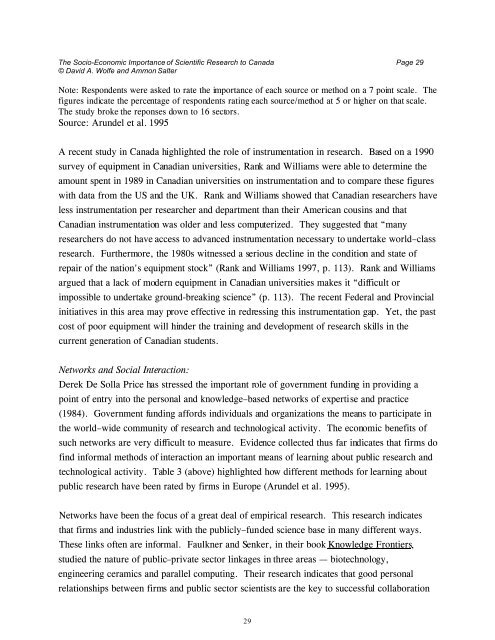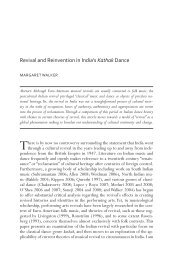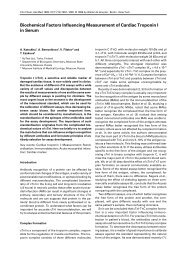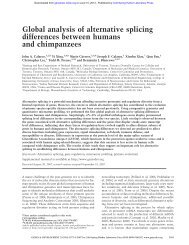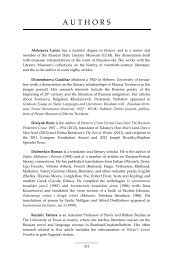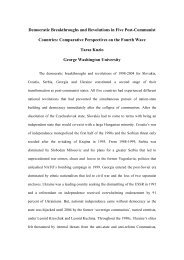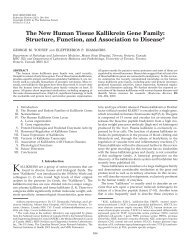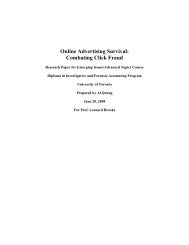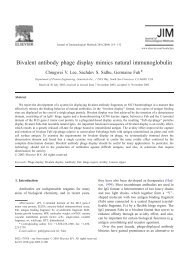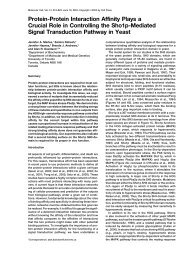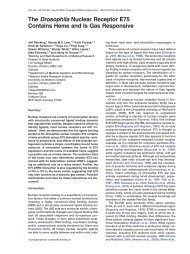The Socio-Economic Importance of Scientific Research To Canada
The Socio-Economic Importance of Scientific Research To Canada
The Socio-Economic Importance of Scientific Research To Canada
Create successful ePaper yourself
Turn your PDF publications into a flip-book with our unique Google optimized e-Paper software.
<strong>The</strong> <strong>Socio</strong>-<strong>Economic</strong> <strong>Importance</strong> <strong>of</strong> <strong>Scientific</strong> <strong>Research</strong> to <strong>Canada</strong> Page 29© David A. Wolfe and Ammon SalterNote: Respondents were asked to rate the importance <strong>of</strong> each source or method on a 7 point scale. <strong>The</strong>figures indicate the percentage <strong>of</strong> respondents rating each source/method at 5 or higher on that scale.<strong>The</strong> study broke the reponses down to 16 sectors.Source: Arundel et al. 1995A recent study in <strong>Canada</strong> highlighted the role <strong>of</strong> instrumentation in research. Based on a 1990survey <strong>of</strong> equipment in Canadian universities, Rank and Williams were able to determine theamount spent in 1989 in Canadian universities on instrumentation and to compare these figureswith data from the US and the UK. Rank and Williams showed that Canadian researchers haveless instrumentation per researcher and department than their American cousins and thatCanadian instrumentation was older and less computerized. <strong>The</strong>y suggested that “manyresearchers do not have access to advanced instrumentation necessary to undertake world–classresearch. Furthermore, the 1980s witnessed a serious decline in the condition and state <strong>of</strong>repair <strong>of</strong> the nation's equipment stock” (Rank and Williams 1997, p. 113). Rank and Williamsargued that a lack <strong>of</strong> modern equipment in Canadian universities makes it “difficult orimpossible to undertake ground-breaking science” (p. 113). <strong>The</strong> recent Federal and Provincialinitiatives in this area may prove effective in redressing this instrumentation gap. Yet, the pastcost <strong>of</strong> poor equipment will hinder the training and development <strong>of</strong> research skills in thecurrent generation <strong>of</strong> Canadian students.Networks and Social Interaction:Derek De Solla Price has stressed the important role <strong>of</strong> government funding in providing apoint <strong>of</strong> entry into the personal and knowledge–based networks <strong>of</strong> expertise and practice(1984). Government funding affords individuals and organizations the means to participate inthe world–wide community <strong>of</strong> research and technological activity. <strong>The</strong> economic benefits <strong>of</strong>such networks are very difficult to measure. Evidence collected thus far indicates that firms d<strong>of</strong>ind informal methods <strong>of</strong> interaction an important means <strong>of</strong> learning about public research andtechnological activity. Table 3 (above) highlighted how different methods for learning aboutpublic research have been rated by firms in Europe (Arundel et al. 1995).Networks have been the focus <strong>of</strong> a great deal <strong>of</strong> empirical research. This research indicatesthat firms and industries link with the publicly–funded science base in many different ways.<strong>The</strong>se links <strong>of</strong>ten are informal. Faulkner and Senker, in their book Knowledge Frontiers,studied the nature <strong>of</strong> public–private sector linkages in three areas — biotechnology,engineering ceramics and parallel computing. <strong>The</strong>ir research indicates that good personalrelationships between firms and public sector scientists are the key to successful collaboration29


